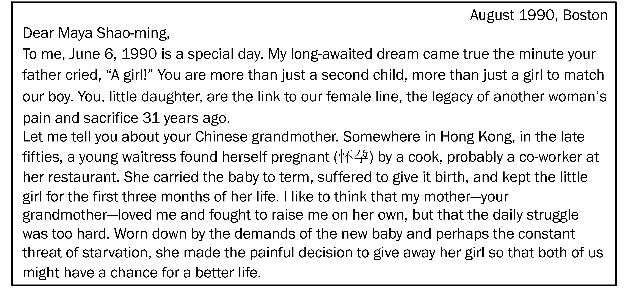
2022年全国乙卷高考英语真题及答案(完整听力版)
06月09日


点击左上角黑色按钮将2014年江苏高考英语试题及答案下载到本地电脑。
2014年江苏高考英语暂时只有word版本的试题,答案还未公布,若查看2014年江苏高考英语答案请点击2014年江苏高考试题及答案查看更多
2014年江苏高考英语试题
第一部分听力(共两节,满分20分)
做题时,先将答案标在试卷上。录音内容结束后,你将有两分钟的时间将试卷上的答案转涂到答题卡上。
第一节(共5小题;每小题1分,满分5分)
听下面5段对话。每段对话后有一个小题,从题中所给的A、B、C三个选项中选出最佳选项,并标在试卷的相应位置。听完每段对话后,你都有10秒钟的时间来回答有关小题和阅读下一小题。每段对话仅读一遍。
例:Howmuchistheshirt?
A.£19.15. B.£9.18. C.£9.15.
答案是C。
1.Whatdoesthewomanwanttodo?
A.Findaplace. B.Buyamap. C.Getanaddress.
2.Whatwillthemandoforthewoman?
A.Repairhercar. B.Giveheraride. C.pickupheraunt.
3.WhomightMr.petersonbe?
A.Anewprofessor. B.Adepartmenthead. C.Acompanydirector.
4.Whatdoesthemanthinkofthebook?
A.Quitedifficult. B.Veryinteresting. C.Toosimple.
5.Whatarethespeakerstalkingabout?
A.Weather. B.Clothes. C.News.
第二节(共15小题;每小题1分,满分15分)
听下面5段对话或独白。每段对话或独白后有几个小题,从题中所给的A、B、C三个选项中选出最佳选项,并标在试卷的相应位置。听每段对话或独白前,你将有时间阅读各个小题,每小题5秒钟;听完后,各小题给出5秒钟的作答时间。每段对话或独白读两遍。
听第6段材料,回答第6、7题。
6.WhyisHarryunwillingtojointhewoman?
A.Hehasapaininhisknee. B.HewantstowatchTV. C.Heistoolazy.
7.Whatwillthewomanprobablydonext?
A.Stayathome. B.TakeHarrytohospital. C.Dosomeexercise.
听第7段材料,回答第8、9题。
8.Whenwillthemanbehomefromwork?
A.At5:45. B.At6:15. C.At6:50.
9.Wherewillthespeakersgo?
A.TheGreenHouseCinema. B.TheNewStateCinema. C.TheUMECinema.
听第8段材料,回答第10至12题。
10.HowwillthespeakersgotoNewYork?
A.Byair. B.Bytaxi. C.Bybus.
11.Whyarethespeakersmakingthetrip?
A.Forbusiness. B.Forshopping. C.Forholiday.
12.Whatistheprobablerelationshipbetweenthespeakers?
A.Driverandpassenger. B.Husbandandwife. C.Fellowworkers.
听第9段材料,回答第13至16题。
13.Wheredoesthisconversationprobablytakeplace?
A.Inarestaurant. B.Inanoffice. C.Inaclassroom.
14.WhatdoesJohndonow?
A.He’satrainer. B.He’satourguide. C.He’sacollegestudent.
15.Howmuchcananewpersonearnforthefirstyear?
A.$10,500. B.$12,000. C.$15,000.
16.Howmanypeoplewillthewomanhire?
A.Four. B.Three. C.Two.
听第10段材料,回答第17至20题。
17.Howlonghasthespeakerlivedinabigcity?
A.Oneyear. B.Tenyears. C.Eighteenyears.
18.Whatisthespeaker’sopiniononpublictransport?
A.It’scomfortable . B.It’stime-saving. C.It’scheap.
19.Whatisgoodaboutlivinginasmalltown?
A.It’ssafer. B.It’shealthier. C.It’smoreconvenient.
20.Whatkindoflifedoesthespeakerseemtolikemost?
A.Busy. B.Colourful. C.Quiet.
第二部分:英语知识运用(共两节,满分35分)
第一节:单项填空(共15小题;每小题1分,满分15分)
请阅读下面各题,从题中所给的A、B、C、D四个选项中,选出最佳选项,并在答题卡上
将该项涂黑。
例:Itisgenerallyconsideredunwisetogiveachild________heorshewants.
A.however B.whatever C.whichever D.whenever
答案是B。
21.Lessonscanbelearnedtofacethefuture,________historycannotbechanged.
A.though B.as C.since D.unless
22.Thebookhashelpedmegreatlyinmydailycommunication,especiallyatwork________agood
impressionisamust.
A.which B.when C.as D.where
23.—HowmuchdoyouknowabouttheYouthOlympicGamestobeheldinNanjing?
—Well,themedia________itinavarietyofforms.
A.cover B.willcover C.havecovered D.covered
24.Tomalwaysgoesjogginginthemorningandheusuallydoespush-upstootostay________.
A.inplace B.inorder C.inshape D.infashion
25.Topgraduatesfromuniversitiesare________bymajorcompanies.
A.chased B.registered C.offered D.compensated
26.—Whatamess!Youarealwayssolazy!
—I’mnottoblame,mum.Iam________youhavemademe.
A.how B.what C.that D.who
27.Shewasputunderhousearresttwoyearsagobutremainedapowerful________inlastyear’selection.
A.symbol B.portrait C.identity D.statue
28.Theidea“happiness,”________,willnotsitstillforeasydefinition.
A.toberigid B.tobesure C.tobeperfect D.tobefair
29.Thelecture________,alivelyquestion-and-answersessionfollowed.
A.beinggiven B.havinggiven C.tobegiven D.havingbeengiven
30.—Dad,Idon’tthinkOlivertherightsortofpersonforthejob.
—Isee.I’llgorightawayand________.
A.payhimback B.payhimoff C.puthimaway D.puthimoff
31.Itwassadtomethatthey,sopoorthemselves,________bringmefood.
A.might B.would C.should D.could
32.Ican’tmeetyouonSunday.I’llbe________occupied.
A.also B.just C.nevertheless D.otherwise
33.LegendhasitthattheoriginoftheDragonBoatFestivalisto________thesoulofQuYuan.
A.remember B.remind C.recover D.recall
34.Goodfamiliesaremuchtoalltheirmembers,but________tonone.
A.something B.anything C.everything D.nothing
35.—________!Somebodyhasleftthelabdooropen.
—Don’tlookatme.
A.Dearme B.Hi,there C.ThankgoodnessD.Comeon
第二节:完形填空(共20小题;每小题1分,满分20分)
请阅读下面短文,从短文后各题所给的A、B、C、D四个选项中,选出最佳选项,并在答题卡上将该项涂黑。
DaleCarnegierosefromtheunknownofaMissourifarmtointernationalfamebecausehefoundawaytofillauniversalhumanneed.
Itwasaneedthathefirst 36backin1906whenyoungDalewasajunioratStateTeachersCollegeinWarrensburg.Togetan37,hewasstrugglingagainstmanydifficulties.Hisfamilywaspoor.HisDadcouldn’taffordthe38atcollege,soDalehadtoridehorseback12milestoattendclasses.Studyhadtobedone39hisfarm-workroutines.Hewithdrewfrommanyschoolactivities40hedidn’thavethetimeorthe41 .Hehadonlyonegoodsuit.Hetried42thefootballteam,butthecoachturnedhimdownforbeingtoo43.DuringthisperiodDalewasslowly44aninferioritycomplex(自卑感),whichhismotherknewcould45himfromachievinghisrealpotential.She46thatDalejointhedebatingteam,believingthat47inspeakingcouldgivehimtheconfidenceandrecognitionthatheneeded.
Daletookhismother’sadvice,trieddesperatelyandafterseveralattempts48madeit.Thisprovedtobea49pointinhislife.Speakingbeforegroupsdidhelphimgainthe50heneeded.BythetimeDalewasasenior,hehadwoneverytophonorin51.Nowotherstudentswerecomingtohimforcoachingandthey,52,werewinningcontests.
Outofthisearlystruggleto53hisfeelingsofinferiority,Dalecametounderstandthattheabilityto54anideatoanaudiencebuildsaperson’sconfidence.And,55it,Daleknewhecoulddoanythinghewantedtodo—andsocouldothers.
36.A.admitted B.filled C.supplied D.recognized
37.A.assignment B.education C.advantage D.instruction
38.A.training B.board C.teaching D.equipment
39.A.between B.during C.over D.through
40.A.while B.when C.because D.though
41.A.permits B.interest C.talent D.clothes
42.A.on B.for C.in D.with
43.A.light B.flexible C.optimistic D.outgoing
44.A.gaining B.achieving C.developing D.obtaining
45.A.prevent B.protect C.save D.free
46.A.suggested B.demanded C.required D.insisted
47.A.presence B.practice C.patience D.potential
48.A.hopefully B.certainly C.finally D.naturally
49.A.key B.breaking C.basic D.turning
50.A.progress B.experience C.competence D.confidence
51.A.horse-ridingB.football C.speech D.farming
52.A.inreturn B.inbrief C.inturn D.infact
53.A.convey B.overcome C.understand D.build
54.A.express B.stress C.contribute D.repeat
55.A.besides B.beyond C.like D.with
第三部分:阅读理解(共15小题;每小题2分,满分30分)
请阅读下列短文,从短文后各题所给的A、B、C、D四个选项中,选出最佳选项,并在答题卡上将该项涂黑。
A

56.WhydidtheBeauxArtsstyleattractAmericanentrepreneurs?
A.Ithelpeddisplaytheirmoneystatus.B.Itwascreatedbyfamousarchitects.
C.Itwasnamedafterafamousinstitute.D.Itrepresentedthe19thcenturyurbanculture.
57.WhatisuniqueofSieMaticBeauxArts?
A.Itsdesignsareanti-conventional.
B.Itsdesignscomefromfamousstructures.
C.Itscustomerscanenjoytheirowncomposition.
D.Itscustomerscanchoosefromvariousnewstyles.
B
Howeverwealthywemaybe,wecanneverfindenoughhoursinthedaytodoeverythingwewant.Economicsdealswiththisproblemthroughtheconceptofopportunitycost,whichsimplyreferstowhethersomeone’stimeormoneycouldbebetterspentonsomethingelse.
Everyhourofourtimehasavalue.Foreveryhourweworkatonejobwecouldquiteeasilybedoinganother,orbesleepingorwatchingafilm.Eachoftheseoptionshasadifferentopportunitycost—namely,whattheycostusinmissedopportunities.
Sayyouintendtowatchafootballmatchbuttheticketsareexpensiveanditwilltakeyouacoupleofhourstogettoandfromthestadium.Whynot,youmightreason,watchthegamefromhomeandusetheleftovermoneyandtimetohavedinnerwithfriends?This—thealternativeuseofyourcashandtime—istheopportunitycost.
Foreconomists,everydecisionismadebyknowledgeofwhatonemustforgo—intermsofmoneyandenjoyment—inordertotakeitup.Byknowingpreciselywhatyouarereceivingandwhatyouaremissingouton,yououghttobeabletomakebetter-informed,morereasonabledecisions.Considerthatmostfamouseconomicruleofall:there’snosuchthingasafreelunch.Evenifsomeoneofferstotakeyououttolunchforfree,thetimeyouwillspendintherestaurantstillcostsyousomethingintermsofforgoneopportunities.
Somepeoplefindtheideaofopportunitycostextremelydiscouraging:imaginespendingyourentirelifecalculatingwhetheryourtimewouldbebetterspentelsewheredoingsomethingmoreprofitable orenjoyable.Yet,inasenseit’shumannaturetodopreciselythat—weassesstheadvantagesanddisadvantagesofdecisionsallthetime.
Inthebusinessworld,apopularphraseis“valueformoney.”peoplewanttheircashtogoasfaraspossible.However,anotherisfastobtaininganadvantage:“valuefortime.”Thebiggestrestrictiononourresourcesisthenumberofhourswecandevotetosomething,sowelooktomaximizethereturnwegetonourinvestmentoftime.Byreadingthispassageyouaregivingoverabitofyourtimewhichcouldbespentdoingotheractivities,suchassleepingandeating.Inreturn,however,thispassagewillhelpyoutothinklikeaneconomist,closelyconsideringtheopportunitycostofeachofyourdecisions.
58.Accordingtothepassage,theconceptof“opportunitycost”isappliedto________.
A.makingmoremoney B.takingmoreopportunities
C.reducingmissedopportunities D.weighingthechoiceofopportunities
59.The“leftover...time”inparagraph3probablyreferstothetime________.
A.sparedforwatchingthematchathome B.takentohavedinnerwithfriends
C.spentonthewaytoandfromthematch D.savedfromnotgoingtowatchthematch
60.Whatareforgoneopportunities?
A.Opportunitiesyouforgetindecision-making. B.Opportunitiesyougiveupforbetterones.
C.Opportunitiesyoumissaccidentally. D.Opportunitiesyoumakeupfor.
C
Mostdamagingly,angerweakensaperson’sabilitytothinkclearlyandkeepcontroloverhisbehaviour.Theangrypersonlosesobjectivityinevaluatingtheemotionalsignificanceofthepersonorsituationthatarouseshisanger.
Noteveryoneexperiencesangerinthesameway;whatangersonepersonmayamuseanother.Thespecificexpressionofangeralsodiffersfrompersontopersonbasedonbiologicalandculturalforces.Incontemporaryculture,physicalexpressionsofangeraregenerallyconsideredtoosociallyharmfultobetolerated.Wenolongerregardduels(决斗)asanappropriateexpressionofangerresultingfromoneperson’sawarenessofinsultingbehaviouronthepartofanother.
Angercanbeidentifiedinthebrain,wheretheelectricalactivitychanges.UndermostconditionsEEG(脑电图)measuresofelectricalactivityshowbalancedactivitybetweentherightandleftprefrontal(额叶前部)areas.Behaviourallythiscorrespondstothegeneraleven-handeddisposition(意向)thatmostofuspossessmostofthetime.ButwhenweareangrytheEEGoftherightandleftprefrontalareasaren’tbalancedand,asaresultofthis,we’relikelytoreact.Andourbehaviouralresponsetoangerisdifferentfromourresponsetootheremotions,whetherpositiveornegative.
Mostpositiveemotionsareassociatedwithapproachbehaviour:wemoveclosertopeoplewelike.Mostnegativeemotions,incontrast,areassociatedwithavoidancebehaviour:wemoveawayfrompeopleandthingsthatwedislikeorthatmakeusanxious.Butangerisanexceptiontothispattern.Theangrierweare,themorelikelywearetomovetowardstheobjectofouranger.Thiscorrespondstowhatpsychologistsrefertoasofensiveanger:theangrypersonmovescloserinordertoinfluenceandcontrolthepersonorsituationcausinghisanger.Thisapproach-and-confrontbehaviourisaccompaniedbyaleftwardprefrontalasymmetry(不对称)ofEEGactivity.Interestingly,thisasymmetrylessensiftheangrypersoncanexperienceempathy(同感)towardstheinp>
61.The“duels”exampleinparagraph2provesthattheexpressionofanger________.
A.usuallyhasabiologicalbasis B.variesamongpeople
C.issociallyandculturallyshaped D.influencesone’sthinkingandevaluation
62.Whatchangescanbefoundinanangrybrain?ZXXK
A.Balancedelectricalactivitycanbespotted.
B.Unbalancedpatternsarefoundinprefrontalareas.
C.Electricalactivitycorrespondstoone’sbehaviour.
D.Electricalactivityagreeswithone’sdisposition.
63.Whichofthefollowingistypicalofoffensiveanger?
A.Approachingthesourceofanger. B.Tryingtocontrolwhatisdisliked.
C.Movingawayfromwhatisdisliked. D.Feelinghelplessinthefaceofanger.
64.Whatisthekeymessageofthelastparagraph?
A.Howangerdiffersfromotheremotions. B.Howangerrelatestootheremotions.
C.Behaviouralresponsestoanger. D.Behaviouralpatternsofanger.
D


65.WhyisJune6,1990aspecialdayforMommy?
A.Herdreamofbeingamothercametrue.
B.ShefoundheroriginfromherChinesemother.
C.Shewrotethelettertoherdaughter.
D.Herfemalelinewaswelllinked.
66.HowdoesMommyfeelaboutherbeinggivenaway?
A.Itisbitteranddisappointing.
B.Itispainfulbutunderstandable.
C.Shefeelssorrybutsympathetic.
D.Shefeelshurtandangry.
67.Whatdoes“Istoodoutlikeasorethumb”inparagraph5mean?
A.Iwalkedclumsilyoutofpains.
B.Iwasnoteasytoloveduetojealousy.
C.Iwasimpatientoutoffear.
D.Ilookeddifferentfromothers.
68.WhatcanbeinferredfromMommy’sAnglofamilylife?
A.Sheusedtoexperienceanidentitycrisis.
B.ShefoughtagainstherAmericanidentity.
C.Sheforgotthepainsofherearlyyears.
D.ShekeptherloveforAsiafromchildhood.
69.WhydidMommynameherdaughter“Shao-ming?”
A.Tomatchherownbirth-name.
B.Tobrightenthelivesofthefamily.
C.ToidentifyherwithChineseorigin.
D.TojustifyherprideinChineseculture.
70.By“Yourpastismorecompletethanmine,”Mommymeans________.
A.herpastwascompletedearlierthanShao-ming’s
B.Shao-minghasgotmotherlycareandasenseofroots
C.hermotherdidn’tcomfortherthewayshedidShao-ming
D.herpastwasspentbrokenly,firstinAsia,thenintheUS
第四部分:任务型阅读(共10小题;每小题1分,满分10分)
请阅读下面短文,并根据所读内容在文章后表格中的空格里填入一个最恰当的单词。
注意:请将答案写在答题卡上相应题号的横线上。每个空格只填一个单词。
Theexpression,“everybody’sdoingit,”isverymuchatthecenteroftheconceptofpeerpressure.Itisastronginfluenceofagroup,especiallyofchildren,onmembersofthatgrouptobehaveaseverybodyelsedoes.Itcanbepositiveornegative.Mostpeopleexperienceitinsomewayduringtheirlives.
peoplearesocialcreaturesbynature,andsoitishardlysurprisingthatpartoftheirself-respectcomesfromtheapprovalofothers.Thisinstinct(天性)iswhytheapprovalofpeers,orthefearofdisapproval,issuchapowerfulforceinmanypeople’slives.Itisthesameinstinctthatdrivespeopletodressonewayathomeandanotherwayatwork,ortoanswer“fine”whenastrangerasks“howareyou?”evenifitisnotnecessarilytrue.Thereisapracticalaspecttothis:ithelpssocietytofunctionefficiently,andencouragesagenerallevelofself-disciplinethatsimplifiesday-to-dayinteraction.
Forcertaininp>
However,peerpressureisnotalwaysnegative.Astudentwhosefriendsaregoodatacademicsmaybeurgedtostudyharderandgetgoodgrades.playersonasportsteammayfeeldriventoplayharderinordertohelptheteamwin.Thistypeofinfluencecanalsogetafriendoffdrugs,ortohelpanadulttakeupagoodhabitordropabadone.Studygroupsandclassprojectsareexamplesofpositivepeergroupsthatencouragepeopletobetterthemselves.
Schoolstrytoteachkidsaboutthedangersofnegativepeerpressure.Theyteachkidstostandupandbethemselves,andencouragethemtopolitelydeclinetodothingsthattheybelievearewrong.Similarly,itcanbehelpfultoencouragechildrentogreetthebeneficialinfluenceofpositivepeergroups.

第五部分:书面表达(满分25分)
81.请阅读下面短文,并按照要求用英语写一篇150词左右的文章。
Whenwereadnewspapers,weoftencomeacrosssuchEnglishwordsas“AIDS”and“pK.”WhenwewatchTV,wefrequentlyhearwordslike“NBA”or“pM2.5.”Whenwespeak,weautomaticallyusewordslike“OUT”来自://www.win789.comor“Bye-bye.”Englishwordsandexpressionslikethesearegettingpopular.Theyhavealreadybecomepartofourdailylanguage.And239EnglishwordshavebeenincludedinthelatestDictionaryofContemporaryChinese.ZXXK
Theinclusionhasstartedaheateddiscussion.AgroupofscholarssignedaletterofcomplaintovertheinclusionoftheseEnglishwords,which,theythink,goesagainstChineselanguagepolicies.TheynotonlyworrythatChineseisborrowinganincreasingnumberofEnglishwordsbutarealsoconcernedthattheinclusionmayhurtthedignityoftheChineselanguage.However,othersareinfavoroftheinclusionbecauseitishardtosaywhetheritwillthreatentheChineselanguage.Theybelievetheselectionismostlyaresultoftheirfunctionanduseindailylife.
[写作内容]
1.用约30个单词写出上文概要;
2.用约120个单词发表你的观点,内容包括:
(1)支持或反对汉语词典收录英语词汇;
(2)用2-3个理由或论据支撑你的观点。
[写作要求]
1.可以支持文中任一观点,但必须提供理由或论据;
2.阐述观点或提供论据时,不能直接引用原文语句;
3.作文中不能出现真实姓名和学校名称;
4.不必写标题。
[评分标准]
内容完整,语言规范,语篇连贯,词数适当。
英语试题参考答案
第一部分(共20小题;每小题1分,共20分)
1.A 2.B 3.C 4.B 5.A 6.B 7.C 8.A 9.C 10.A
11.A 12.C 13.B 14.C 15.A 16.C 17.B 18.C 19.A 20.B
第二部分(共35小题;每小题1分,共35分)
21.A 22.D 23.C 24.C 25.A 26.B 27.A 28.B 29.D 30.B
31.C 32.D 33.D 34.C 35.A 36.D 37.B 38.B 39.A 40.C
41.D 42.B 43.A 44.C 45.A 46.A 47.B 48.C 49.D 50.D
51.C 52.C 53.B 54.A 55.D
第三部分(共15小题;每小题2分,共30分)
56.A 57.C 58.D 59.C 60.B 61.C 62.B 63.A 64.D 65.D
66.B 67.D 68.A 69.C 70.B
第四部分(共10小题;每小题1分,共10分)
71.feeling 72.influences 73.practical 74.unconsciously
75.inp>
79.independent 80.no
第五部分(满分25分)
81.支持:
Today,moreandmoreEnglishwordsfindtheirwayintotheChineselanguage.EventheDictionaryofContemporaryChineseincludes239Englishwords.Somepeoplesupportitwhileothersdonot.
Generally,Iaminfavouroftheinclusion.AsthenumberofEnglishlearnersisontherise,it’snotdifficultforthemtounderstandthesewordsinChinesecontexts.Besides,itis,onsomeoccasions,moreconvenienttouseEnglishwords.Mostpeoplenowadaysuse“IT”insteadofitstranslation“xinxijishu.”Inourglobalvillage,wecanseethatit’snotuncommonforonelanguagetoborrowwordsfromotherlanguages.InEnglish,therearemanywordsborrowedfromLatin,French,orevenChinese.Infact,Chinesehasneverstoppedtakingwordsfromotherlanguages,say,“ganbu”or“minzhu”fromJapanese.
So,it’ssafetoconcludethatitisreasonabletoincludeEnglishwhichfacilitatesdailycommunication.
反对:
WithEnglish来自://www.win789.comwordsgettingpopularinbothmediaanddailylife,aChinesedictionaryhasincluded239ofthem,leavingthepublicp>
Itendtotakethe“Against”sidefortworeasons.Firstly,thisinclusionhasactuallypollutedourmothertongue.Soonerorlater,manyEnglishaccentswillriseandfallwiththefourChinesetones.And,rulesdon’ttellushowtopronouncesuchEnglish-turnedChinesewordsas“wifi”and“Out”inaChineseway!Secondly,suchaninclusionmaygiverisetoprejudicesoftheeducatedagainstthosewithlittleknowledgeofEnglish.Justforoneillustration,whilecollegestudentstake“Bye-bye”forgrantedwhenpartingfromeachother,itmayunconsciouslyhurtthefeelingsofsomeonewhoisusedto“zaijian.”
Inshort,notonlyhastheinclusionpoisonedChinese,itmayalsobringaboutdistancebetweentheChinesepeople.

